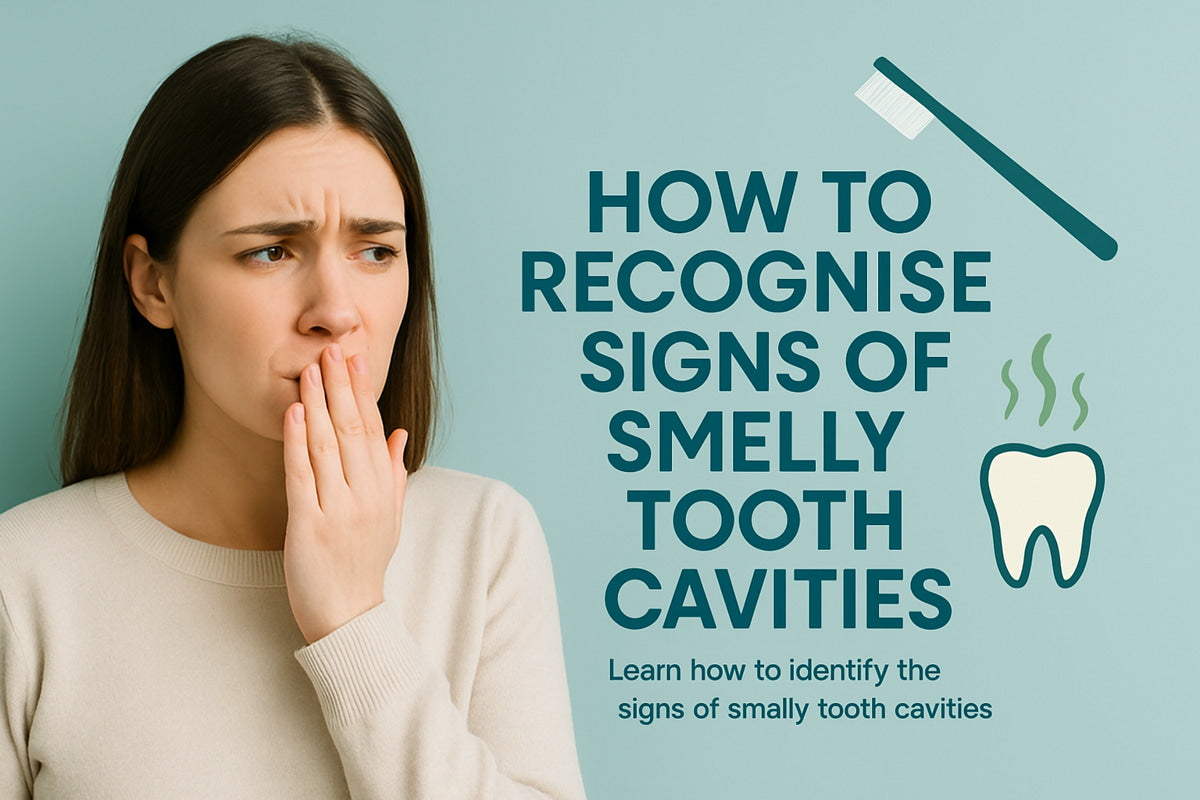Bad breath that won’t go away, especially if it seems to come from a specific tooth, could be more than just poor hygiene. It might be a sign of a smelly tooth cavity.
Even with daily brushing and flossing, tooth decay can still develop and cause lingering odours or a strange taste in your mouth. Left untreated, these cavities can lead to infections, discomfort and more serious dental issues.
In this article, you’ll learn how to spot the warning signs of a cavity-related smell, what causes it and when it’s time to act.
What is a Smelly Tooth Cavity?
A smelly tooth cavity is a tooth affected by decay that emits a foul odour due to the breakdown of food particles, bacteria and tissue. When cavities progress deep enough into the enamel and dentine layers, they create a breeding ground for bacteria.
These bacteria release volatile sulphur compounds (VSCs), the same substances responsible for bad breath that smells like rotten eggs or sulphur.
Unlike general halitosis, which might come from the tongue or throat, cavity-related smells are often localised, coming from one tooth or a specific part of your mouth.
Signs That a Tooth Cavity Might Be Smelly
Tooth decay doesn’t always hurt at first, but when it smells, it's a sign the issue is advancing. Here are the most common indicators:
1. Persistent Bad Breath That Doesn’t Go Away
If your breath still smells bad even after brushing, flossing or using mouthwash, it might be due to decay trapped inside a cavity.
2. Unpleasant Taste in the Mouth
A strange, bitter or metallic taste that lingers in your mouth may indicate a rotting or infected tooth. It’s your body’s way of alerting you that something’s not right.
3. Visible Dark Spots or Holes
Stand in front of a mirror and examine your teeth closely. Brown or black spots or visible pits can be signs of advanced tooth decay.
4. Tooth Sensitivity
Are you flinching when drinking cold water or eating sweets? Increased sensitivity, especially in one tooth, could be a sign of a cavity reaching the nerve.
5. Pain When Biting or Chewing
Pain or discomfort when chewing may suggest that decay has weakened your tooth structure or reached the inner layers.
6. Swelling or Gum Irritation Around One Tooth
A cavity can lead to inflammation in the surrounding gum tissue. If the area near a tooth looks red or swollen and smells unpleasant, it could be a sign of infection or abscess.
Read Also: Cavity Odour: A Warning Sign for Your Dental Health
What Causes Cavities to Smell?
Tooth cavities are the result of plaque bacteria feeding on sugars in your food and drinks. As they digest these sugars, bacteria produce acids that slowly wear down tooth enamel.
When cavities deepen:
-
Food particles can get trapped and rot
-
Bacteria flourish and produce VSCs
-
Pulp tissue inside the tooth may begin to die
-
Infection can set in, releasing a strong, foul odour
Once decay reaches this level, brushing alone won’t help. The cavity needs to be treated and sealed by a dental professional.
Can a Smelly Tooth Cavity Heal on Its Own?
No. Unfortunately, once a cavity has developed, it cannot repair itself. While fluoride treatments can help remineralise early signs of enamel erosion, deeper decay requires intervention.
If you’re noticing a smell, the cavity is likely already into the dentine layer, or worse, the nerve. The sooner it's treated, the more of the tooth we can save.
Tips to Prevent Smelly Tooth Cavities
Prevention is the key to fresh breath and healthy teeth. Here are our top tips:
-
Brush twice daily with fluoride toothpaste.
-
Floss every day to remove plaque between teeth.
-
Rinse with an antimicrobial or pH-balanced mouthwash.
-
Avoid frequent snacking on sugary or acidic foods.
-
Stay hydrated—dry mouth increases your risk of decay.
-
Book regular check-ups with Breezecare for early detection and prevention.
How BreezeCare Can Help
At BreezeCare, we go beyond the basics. We offer:
-
Comprehensive dental examinations to detect and treat cavities early
-
Breath testing to identify volatile sulphur compounds and pinpoint odour sources
-
Professional cleaning to remove plaque and bacteria in hard-to-reach areas
-
Restorative treatments like fillings, inlays or root canals, if decay is advanced
Our team specialises in both breath disorders and tooth decay management, so we can create a tailored plan that restores your confidence and oral health.
Final Thoughts
A smelly tooth cavity isn’t just a cosmetic concern. It’s a sign of active decay that could threaten your oral health. If something smells off in your mouth, don’t ignore it. It’s your body’s way of alerting you to a potential problem. The good news? Help is close at hand.
BreezeCare’s clinic offers expert assessment and tailored solutions to help you tackle bad breath and cavity-related concerns with confidence. Book a visit or get in touch with our team today and take the next step towards a fresher, healthier smile.











